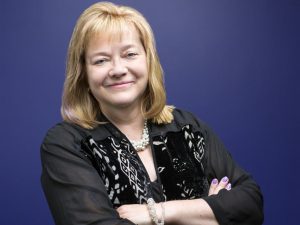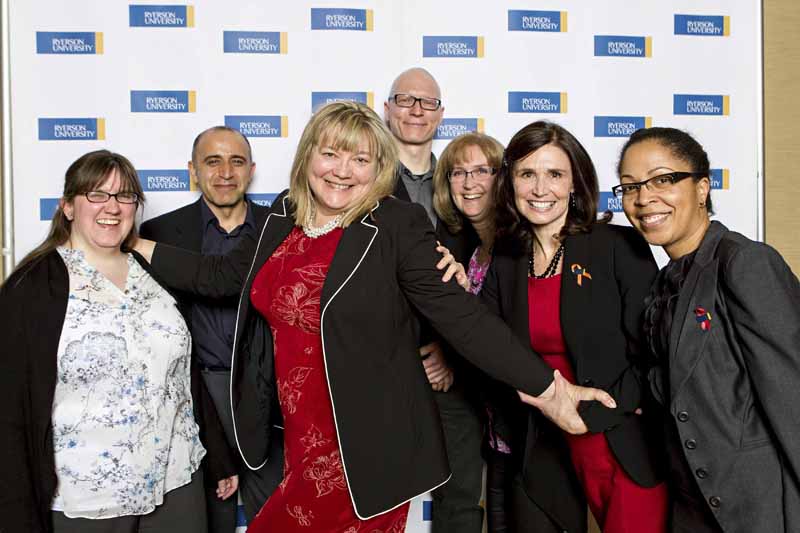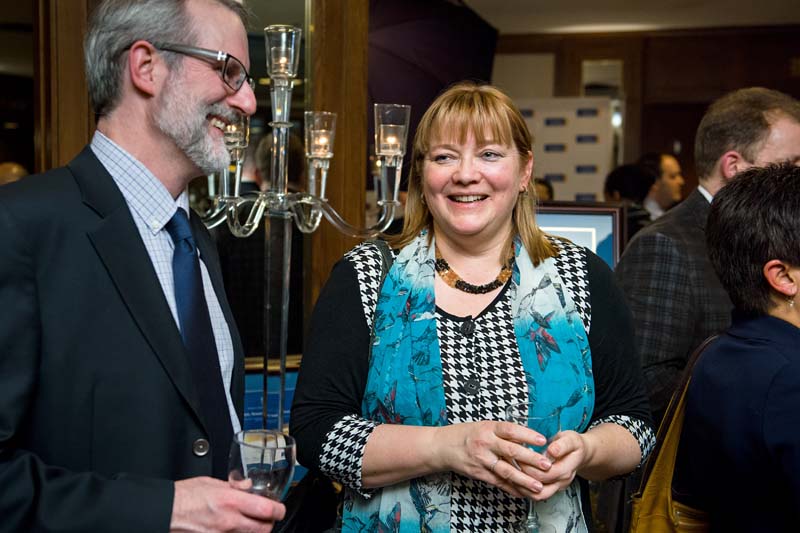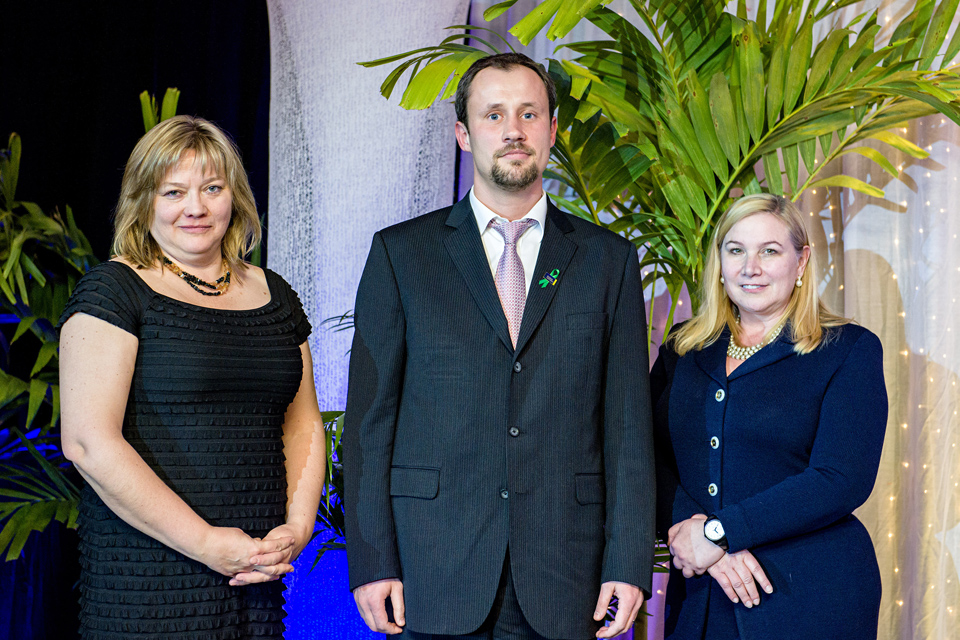
Media
#ChangeTheNumbers
In her talk, Imogen Coe addresses the lack of female representation in STEM; science, technology, engineering and math. Using humour and real life examples, she encourages women (and their allies) to break barriers, challenge stereotypes and demand their opportunity to contribute to science Dr. Imogen Coe has worked extensively as an academic scientist and administrator, challenging stereotypes and breaking barriers for girls and women in her field. Imogen sees the the lack of equity, diversity and inclusivity in STEM at Ryerson University in her role as professor and dean of the faculty of science. Low confidence levels and under-representation of young women in STEM disciplines means that we are losing important skill sets and talent, limiting our ability to solve complex problems such as climate change. Imogen is an advocate for women in STEM and she uses data and evidence to demonstrate unfair practices, while providing suggestions on how to fix the system. As someone who was raised with a strong sense of social justice, Imogen believes in the fundamental right of everyone to contribute and participate in STEM to their full potential. Imogen firmly believes that EDI in STEM is not just a woman’s rights issue, but a human rights issue.
Ryerson #IMACHANGEMAKER Spotlight Series: Imogen Coe, Dean, Faculty of Science
Ryerson's #IMACHANGEMAKER Spotlight Series highlights outstanding changemakers from Ryerson University. Featured Changemaker: Imogen Coe, Dean, Faculty of Science -- From implementing corporate social responsibility programs in private companies, to creating enterprises with a social purpose, to introducing new ways of thinking and operating into existing not-for-profit institutions, Ryerson students, faculty and staff are working with community and industry partners to make an impact on the social innovation landscape. Ryerson University is Canada's first Changemaker Campus designated by Ashoka, a global community of action that works to increase the impact of social ventures. Ryerson is addressing real-world societal challenges by mainstreaming social innovation across the university to advance processes, products, and services aimed at promoting social goals. Learn more about social innovation and changemaking at Ryerson here: www.ryerson.ca/socialinnovation
Ryerson University Women in Leadership: Women in Academia - October 28, 2014
Panel discussion on Women in Academia: Unmasking the complexities in rising to the top. Moderated by Denise O'Neil Green, Assistant Vice President/Vice Provost, Equity, Diversity & Inclusion, panelists are: Imogen Coe, Dean, Faculty of Science Elizabeth Evans, Associate Dean, Academic Programs, TRSM Carla Cassidy, Professor, Department of Politics (and former Interim Vice President, Research and Innovation) Marie Bountrogianni, Dean, The G. Raymond Chang School of Continuing Education. They share their career paths, complexities and challenges along the way, and how they have arrived at their current position.
Knowledge Connection - October 26th, 2016
Topic: #ChangeTheNumbers Presenter: Imogen R. Coe, PhD, Dean, Faculty of Science Ryerson University ******************************************************************** Dr. Imogen R. Coe, is a research scientist and academic administrator. In addition to her academic research, teaching and administration, she is passionate about shattering stereotypes and breaking barriers for girls and women in STEM (Science, Technology, Engineering and Math). ******************************************************************** When: Wednesday, October 26, 2016 12:00 to 13:00 hrs Where: Conference Centre, 1E201
Change the Numbers: Equity, Diversity, and Inclusivity in STEM | Imogen Coe | TEDxRyersonU
In her talk, Imogen Coe addresses the lack of female representation in STEM; science, technology, engineering and math. Using humour and real life examples, she encourages women (and their allies) to break barriers, challenge stereotypes and demand their opportunity to contribute to science Dr. Imogen Coe has worked extensively as an academic scientist and administrator, challenging stereotypes and breaking barriers for girls and women in her field. Imogen sees the the lack of equity, diversity and inclusivity in STEM at Ryerson University in her role as professor and dean of the faculty of science. Low confidence levels and under-representation of young women in STEM disciplines means that we are losing important skill sets and talent, limiting our ability to solve complex problems such as climate change. Imogen is an advocate for women in STEM and she uses data and evidence to demonstrate unfair practices, while providing suggestions on how to fix the system. As someone who was raised with a strong sense of social justice, Imogen believes in the fundamental right of everyone to contribute and participate in STEM to their full potential. Imogen firmly believes that EDI in STEM is not just a woman’s rights issue, but a human rights issue. This talk was given at a TEDx event using the TED conference format but independently organized by a local community. Learn more at http://ted.com/tedx
The Life and Contributions of Countess Ada Lovelace: Unintended Consequences of Exclusion, Prejudice & Stereotyping
Published by IEEE Technology and Society Magazine
December 31, 2016
The scientific life and contributions of Augusta Ada King, Countess of Lovelace, are becoming increasingly well-known 200 years after her birth. Ada Lovelace had a privileged existence but lived in a world where girls were limited in the subjects they were taught, where young women were excluded from universities and where gender stereotypes were rigidly enforced. Despite the world in which she lived, Ada is now known as the first computer scientist. Furthermore, her scientific interests extended beyond the “thinking” machine, to biophysics and mathematical modeling of biological processes, and she may have made even more significant contributions to science had she not died at the young age of 36. We discuss the concept that the unintended consequence of her exclusion from the standard approaches to learning and teaching enabled her genius remain unfettered by conventional thinking and thus empowered her to become the visionary she was--suggesting that perhaps the greatest digital innovations will be found by disrupting the cultural constraints typically applied to technology and gender.
URL: http://online.qmags.com/TSM1216?sessionID=C0F96168BF088C77E0128DD82&cid=3477015&eid=20115#pg48&mode2
Persistent Hepatitis C Virus Infection Impairs Ribavirin Antiviral Activity through Clathrin-Mediated Trafficking of Equilibrative Nucleoside Transporter
Published by Journal of Virology
2015 Ribavirin (RBV) continues to be an important component of interferon-free hepatitis C treatment regimens, as RBV alone does not inhibit hepatitis C virus (HCV) replication effectively; the reason for this ineffectiveness has not been established. In this study, we investigated the RBV resistance mechanism using a persistently HCV-infected cell culture system. The antiviral activity of RBV against HCV was progressively impaired in the persistently infected culture, whereas interferon lambda 1 (IFN-λ1), a type III IFN, showed a strong antiviral response and induced viral clearance. We found that HCV replication in persistently infected cultures induces an autophagy response that impairs RBV uptake by preventing the expression of equilibrative nucleoside transporter 1 (ENT1). The Huh-7.5 cell line treated with an autophagy inducer, Torin 1, downregulated membrane expression of ENT1 and terminated RBV uptake. In contrast, the autophagy inhibitors hydroxychloroquine (HCQ), 3-methyladenine (3-MA), and bafilomycin A1 (BafA1) prevented ENT1 degradation and enhanced RBV antiviral activity. The HCV-induced autophagy response, as well as treatment with Torin 1, degrades clathrin heavy chain expression in a hepatoma cell line. Reduced expression of the clathrin heavy chain by HCV prevents ENT1 recycling to the plasma membrane and forces ENT1 to the lysosome for degradation. This study provides a potential mechanism for the impairment of RBV antiviral activity in persistently HCV-infected cell cultures and suggests that inhibition of the HCV-induced autophagy response could be used as a strategy for improving RBV antiviral activity against HCV infection.
N-linked glycosylation of N48 is required for equilibrative nucleoside transporter 1 (ENT1) function
Published by Bioscience Reports
2016 Human equilibrative nucleoside transporter 1 (hENT1) transports nucleosides and nucleoside analogue drugs across cellular membranes and is necessary for the uptake of many anti-cancer, anti-parasitic and anti-viral drugs. Previous work, and in silico prediction, suggest that hENT1 is glycosylated at Asn48 in the first extracellular loop of the protein and that glycosylation plays a role in correct localization and function of hENT1. Site-directed mutagenesis of wild-type (wt) hENT1 removed potential glycosylation sites. Constructs (wt 3xFLAG-hENT1, N48Q-3xFLAG-hENT1 or N288Q-3xFLAG-hENT2) were transiently transfected into HEK293 cells and cell lysates were treated with or without peptide–N-glycosidase F (PNGase-F), followed by immunoblotting analysis. Substitution of N48 prevents hENT1 glycosylation, confirming a single N-linked glycosylation site. N48Q-hENT1 protein is found at the plasma membrane in HEK293 cells but at lower levels compared with wt hENT1 based on S-(4-nitrobenzyl)-6-thioinosine (NBTI) binding analysis (wt 3xFLAG-ENT1 Bmax, 41.5±2.9 pmol/mg protein; N48Q-3xFLAG-ENT1 Bmax, 13.5±0.45 pmol/mg protein) and immunofluorescence microscopy. Although present at the membrane, chloroadenosine transport assays suggest that N48Q-hENT1 is non-functional (wt 3xFLAG-ENT1, 170.80±44.01 pmol/mg protein; N48Q-3xFLAG-ENT1, 57.91±17.06 pmol/mg protein; mock-transfected 74.31±19.65 pmol/mg protein). Co-immunoprecipitation analyses suggest that N48Q ENT1 is unable to interact with self or with wt hENT1. Based on these data we propose that glycosylation at N48 is critical for the localization, function and oligomerization of hENT1.
Novel nuclear hENT2 isoforms regulate cell cycle progression via controlling nucleoside transport and nuclear reservoir
Published by Cellular and Molecular Life Sciences
2016 Nucleosides participate in many cellular processes and are the fundamental building blocks of nucleic acids. Nucleoside transporters translocate nucleosides across plasma membranes although the mechanism by which nucleos(t)ides are translocated into the nucleus during DNA replication is unknown. Here, we identify two novel functional splice variants of equilibrative nucleoside transporter 2 (ENT2), which are present at the nuclear envelope. Under proliferative conditions, these splice variants are up-regulated and recruit wild-type ENT2 to the nuclear envelope to translocate nucleosides into the nucleus for incorporation into DNA during replication. Reduced presence of hENT2 splice variants resulted in a dramatic decrease in cell proliferation and dysregulation of cell cycle due to a lower incorporation of nucleotides into DNA. Our findings support a novel model of nucleoside compartmentalisation at the nuclear envelope and translocation into the nucleus through hENT2 and its variants, which are essential for effective DNA synthesis and cell proliferation.
URL: http://link.springer.com/article/10.1007/s00018-016-2288-9
Novel regulation of equlibrative nucleoside transporter 1 (ENT1) by receptor-stimulated Ca2+-dependent calmodulin binding
Published by American Journal of Physiology-Cell Physiology
2016 Equilibrative nucleoside transporters (ENTs) facilitate the flux of nucleosides, such as adenosine, and nucleoside analog (NA) drugs across cell membranes. A correlation between adenosine flux and calcium-dependent signaling has been previously reported; however, the mechanistic basis of these observations is not known. Here we report the identification of the calcium signaling transducer calmodulin (CaM) as an ENT1-interacting protein, via a conserved classic 1-5-10 motif in ENT1. Calcium-dependent human ENT1-CaM protein interactions were confirmed in human cell lines (HEK293, RT4, U-87 MG) using biochemical assays (HEK293) and the functional assays (HEK293, RT4), which confirmed modified nucleoside uptake that occurred in the presence of pharmacological manipulations of calcium levels and CaM function. Nucleoside and NA drug uptake was significantly decreased (∼12% and ∼39%, respectively) by chelating calcium (EGTA, 50 μM; BAPTA-AM, 25 μM), whereas increasing intracellular calcium (thapsigargin, 1.5 μM) led to increased nucleoside uptake (∼26%). Activation of N-methyl-d-aspartate (NMDA) receptors (in U-87 MG) by glutamate (1 mM) and glycine (100 μM) significantly increased nucleoside uptake (∼38%) except in the presence of the NMDA receptor antagonist, MK-801 (50 μM), or CaM antagonist, W7 (50 μM). These data support the existence of a previously unidentified novel receptor-dependent regulatory mechanism, whereby intracellular calcium modulates nucleoside and NA drug uptake via CaM-dependent interaction of ENT1. These findings suggest that ENT1 is regulated via receptor-dependent calcium-linked pathways resulting in an alteration of purine flux, which may modulate purinergic signaling and influence NA drug efficacy.
URL: http://ajpcell.physiology.org/content/310/10/C808.abstract
Extended exposure to substrate regulates the human equilibrative nucleoside transporter 1 (hENT1)
Published by Nucleosides, Nucleotides and Nucleic Acids
2016 Human equilibrative nucleoside transporter 1 (hENT1) is a major route of entry of nucleosides and nucleoside analog drugs. The regulation of hENT1 is poorly understood in spite of its clinical importance as a drug transporter. Immunofluorescence microscopy and fluorescence-activated cell sorting suggested that cytidine pre-treatment (40 μM, 6 h) promotes hENT1 internalization in a way that does not affect either hENT1-mediated nucleoside uptake or gemcitabine-induced cytotoxicity. The Scatchard plot analyses of our NBTI binding data support previous speculations that hENT1 proteins exist as two sub-populations, and suggest that cytidine pre-treatment leads to the internalization of one population.
URL: http://www.tandfonline.com/doi/abs/10.1080/15257770.2016.1200074
Biography
Dean of the Faculty of Science at Ryerson University and Professor in the Department of Chemistry & Biology. Dr. Coe is an award-winning scientist who continues to conduct research into enhanced understanding drug transport proteins involved in the uptake of anti-cancer, anti-viral and anti-parasite drugs. Dr. Coe is an accomplished researcher and speaker. She has served on several national science review panels. She is internationally recognized for her scientific research which has presented at conferences and seminars across the globe and published in over 70 scholarly papers, book chapters and abstracts. Early in her research career, she was awarded the Premier’s Research Excellence Award (now known as the Early Research Award). Dr. Coe is also a strong and articulate advocate for equity, diversity and inclusivity (EDI) in science, technology, engineering and math (STEM). She is committed to the support, promotion, and retention of women and other under-represented groups in STEM. She is a highly sought speaker who makes the case for evidence-based policy changes that address organizational, institutional, structural & systemic barriers to full EDI in STEM. She is considered to be a national thought leader on these issues. Dr. Coe holds a PhD in Biology from the University of Victoria, an MSc from the University of Victoria and a bachelor’s degree from Exeter University in the U.K. She is an affiliate scientist with Li Ka Shing Knowledge Institute, Keenan Research Centre and St. Michael’s Hospital. She is a member of the Board of Directors of the Michael Garron Hospital (formerly TEGH). Coe is also on the advisory board of hErVOLUTION, a non-profit organization working on access to innovative education and employment services to girls and young women in STEM as well as the advisory council for Girls in STEM, an initiative of FIRST Robotics Canada.
Recognition/Reconnaissance
The WXN Top 100 Most Powerful Women Trail Blazer Award
2016
Additional Titles and Affiliations
York University : Adjunct Member in Graduate Program in Biology
St. Michael’s Hospital : Affiliate Scientist
Ryerson University : Professor in the Department of Chemistry & Biology
Li Ka Shing Knowledge Institute Keenan Research Centre : Affiliate Scientist
Past Talks
The Lexicon of Diversity, Equity and Inclusion: Knowing the enemy within
Filling the Gaps (an organization focused on professional and personal career development for women in Toronto)
Toronto, ON., June 23, 2016
Brilliant Minds: Young Women in Science, Technology, Engineering and Math (STEM) Changing the World
International Women’s Forum Canada Annual “Canada Connects” Conference
Toronto, ON., June 10, 2016
Change the Numbers
Royal Canadian Institute for Science, Gala Dinner
MaRS, Toronto, ON., April 21, 2016
Achieving Diversity in STEM, Advancing Innovation
Chair of the Pre- Symposium and moderator of the “Post-Secondary and Beyond” panel. Canadian Science Policy Conference,
Ottawa, ON., November 8, 2016
#ChangetheNumbers: Diversity in STEM is essential for Canada's economic future
Society for Women Entering Ecology and Evolution Today held at Canadian Society for Ecology and Evolution Annual General Meeting (CSEE2016)
St. John’s, NF., July 7, 2016
Research Grants
Regulation of a transport protein, ENT1
Organization: Natural Sciences and Engineering Research Council (NSERC) of CanadaGrant amount: 280000
Details:
2011 - 2017




